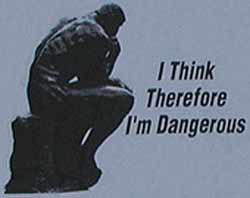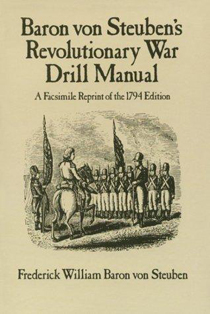LETTERS FROM THE GLOBAL PROVINCE
Thinking is Much Over-Rated, Global Province Letter, 12 October 2011
"I eat, therefore I am"---Dinner Wit Sticking It to Descartes
Understanding Poetry. Even today the handiwork of Cleanth Brooks and Robert Penn Warren's Understanding Poetry could help any college freshman come to grips with the multiple, interwoven meanings that even the shortest of good poems affords to us. They're identified with the New Criticism school of literary analysis, which is much pooh-poohed now, by those few who even know about it. But the New Criticism made us pay attention to the work of art—a poem, a novel, whatever—and dragged us away from Freud, and Marx, and social history, and biography which are all the filters many have used to avoid the rewarding but tough task of closely reading the work at hand.
All that said, we can never forget what the great French and European literature teacher Henri Peyre put forward, as a split-second aside, in one of his stream of consciousness lectures. For he said, "you never really understand a poem until you can recite it from memory." It must become a song in your heart, not a plaything for the brain, if you are to capture its fullness. For Peyre, we think, thinking was much too slow a machine, a sluggish vehicle left behind by cosmic flashes of inspiration.
Poetry teaches us that although we are in love with our fulminations and the twists of our prosaic verbiage, they are but a sideshow to the act going on atop our main stage---our unconscious. If we can be silent long enough and rest the pedestrian parts of our mental Rube Goldberg apparatus, we may just hear the poetic intimations of immortality that spring from the non-verbal corners of our being.
Khan Academy. All this comes to mind as we peruse "How Khan Academy is Changing the Rules of Education." Salman Khan, on the thinnest budget imaginable, has put together 2600 videos which kids can access to learn math and a host of other subjects, both the basics as well as the more complex. We are thinking of looking into the calculus.
What caught our eye is that the professional reform education establishment knocks Khan, saying that the approach amounts to all drilling and no thinking. As Wired comments: "Not everyone agrees. Critics argue that Khan's videos and software encourage uncreative, repetitive drilling—and leave kids staring at screens instead of interacting with real live teachers. Even Khan will acknowledge that he's not an educational professional; he's just a nerd who improvised a cool way to teach people things. And for better or worse, this means that he doesn't have a consistent, comprehensive plan for overhauling school curricula." Drilling, for the educational directorate, is verboten.
And yet it is drilling, in all probability, that has made Catholic grammar school education a success. To be educated, one must learn the basics. That means one must know one's multiplication tables so well that the act of reciting them is an automated, virtually unthinking act. In other words, our memory learns the math before our brain begins to grasp number theory or any of the conceptual structures behind it. Likewise the highly successful Kumon method of math teaching has aspects of drilling and memorization and repetition to it. Absorption precedes understanding. 
Our Most Successful Teaching Institution—The Army. Probably it should be mandatory for every teacher and every principal to do a term of service in the Army. There they would encounter a system of drills that can take hordes of unlettered people and pull them up to a level of proficiency in all manner of endeavor. When you jostle up against comrades in the Army whose neurons move around the nervous system at a very slow pace, you wonder why more people are not killed by rifles, grenades, tanks, and what not in the course of training. But, indeed, everybody progresses, since the Army offers its enlisted small, manageable chunks of content that are digested by endless rounds of repetition. It wins the battle for the mind.
The Power of Chanting. We can further understand the power of unconscious drilling when we see what prayer and songs can do in dealing with the uphill battles of life. There is a large literature about the healing powers of chanting for Buddhist and other monks who shut down their brains and achieve quiescence in order to connect with divinity and rescue their spirits. Troops in the Army and the Marines put aside their pain, even when carrying very full backpacks, when trotting several miles in formation, shouting and singing in unison. The resonance of "Drive On" and "Hail Oh Hail Oh" conjure up enough emotion to obliterate stress.
Boutique Economy. Drilling, the suspension of ordinary discourse, mnemonic existence---these are more than handmaidens of culture and happiness and an expanded view of life. They have something to do with the new economy, which we must strive to achieve. Mass production and mass marketing are doomed in high cost countries trying to survive in a globally connected marketplace. As we have suggested elsewhere, boutique products and boutique marketing must seize the stage.
Yet we lack both the business leaders and the workforce who can bring this economy into being. Even the most advanced developed countries are peopled with bodies and minds who know only mass production, mass marketing, and mass ideas. For our workforce, at least, we require something along the lines of the German apprenticeship system which produces skilled craftsman in a raft of trades who may not have a larger vision of what they are up to, but who can turn out precise, artful products that make Germany such a powerful exporter. Drilling and repetition are the sine qua non of an ultra-skilled workforce. Naught else can conjure up the vital rightness that drenches boutique products with quality and individuality.
Getting Past Valley Forge.  When Washington and his troops wintered at Valley Forge, it seemed as if the war were lost, and that the British as well as their Hessian mercenaries might prevail. But the Army pulled together, even with bare feet, poor rations, and tattered clothing. One German, the Prussian drillmaster Baron von Steuben, helped a great deal and is given considerable credit by some for making a ragged Army rugged. One can read about all this in The Drillmaster of Valley Forge. Apparently some German discipline mixed with America's endlessly inventive nature can rescue us from the most dire of fates and win a Revolution.
When Washington and his troops wintered at Valley Forge, it seemed as if the war were lost, and that the British as well as their Hessian mercenaries might prevail. But the Army pulled together, even with bare feet, poor rations, and tattered clothing. One German, the Prussian drillmaster Baron von Steuben, helped a great deal and is given considerable credit by some for making a ragged Army rugged. One can read about all this in The Drillmaster of Valley Forge. Apparently some German discipline mixed with America's endlessly inventive nature can rescue us from the most dire of fates and win a Revolution.
P.S. In their new book, Great by Choice, Jim Collins and Morton Hansen note that the first thing Steve Jobs did to turn around Apple was "not iTunes, not the iPhone, not the iPad." Instead, "he increased discipline." See "Turbulent Times, Steady Success," Wall Street Journal, October 11, 2011, p.A15. It's easy to miss how important discipline and controlled behavior are for successful human activity, the yin perhaps to the yang of creativity and innovation.
Home - About This Site - Contact Us
Copyright 2011 GlobalProvince.com